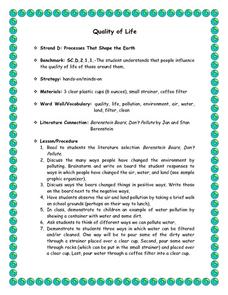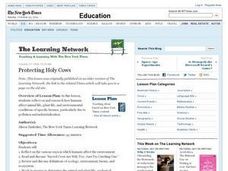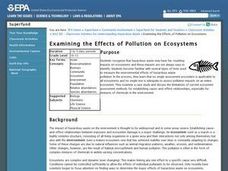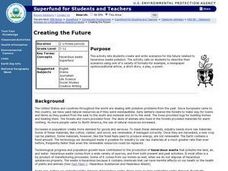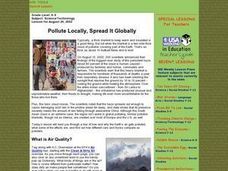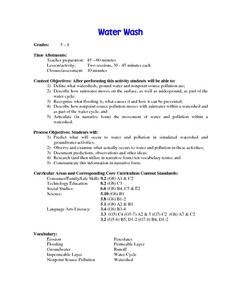Curated OER
Nonpoint Source Pollution in Long Island Sound
Students examine and identify the types of nonpoint pollution on Long Island Sound. In groups, they walk the shoreline, collect trash and identify its source. Using that information, they create a variety of graphs of the different...
Curated OER
Pollution Solutions
Students explore the role of chemicals in the pollution and destruction of ecosystems. They research factors that affect ecosystems and the methods being employed to counter them. In addition, they choose one water ecosystem that has...
Curated OER
What's in the Water?
Fifth graders use the dots to simulate water pollutants in a lake. They use cups to collect a sample of "water." Students sort the dots by color and record the number of each dot color under the correct pollutant name in the Lake Water...
Curated OER
Quality of Life
Students discover that people influence the quality of life of those around them. They read the literature selection 'Berenstein Bears, Don't Pollute' and discuss the many ways people have changed the environment by polluting.
Curated OER
Current Groundwater Contamination Research
Students research the effects of groundwater pollutants on life. They name and describe 1 environmental factor that has an effect on our drinking water. Students read the Water-Groundwater and Pollution Article. They discuss and...
Curated OER
Water Cycle
Ninth graders explore ways water moves through various reservoirs on Earth, examine how human activities change water cycle, investigate substances present in water that indicate human activity, and discuss how understanding water cycle...
Curated OER
Well, Well, Well
Students consider a case of potential water contamination by using a process of reasoned discourse about the definition of the problem, the relevant information, and the values behind different solutions. They consider the role of...
Curated OER
Colors of our Earth
Students are introduces to soil profile classification. They remember that classification of soils is an important aspect of studying soils as it aids in predicting how soils react to weathering, transport nutrients or pollution. ...
Curated OER
I Won't Live in a Toxic World
High schoolers examine four separate environmental health issues using fish-bowl technique, and discuss roles of both government and citizens in maintaining a pollution-free environment.
Curated OER
Water Pollution Lesson Plan: All Messed Up
Students map and calculate the area of the school parking lot and then the volume of water falling on the school parking lot. They map the route surface runoff will take to the nearest water body and describe the roles that human...
Curated OER
Waste Not, Want Not
Students consider the types of debris that litters beaches and conduct research on waste management. They then interview professionals in a particular field of waste management and write reports for a booklet about garbage and sewage to...
Curated OER
Protecting Holy Cows
Students study the interrelationships of organisms and their environments. They study ecological communities and determine what is necessary for survival. Students discuss and answer questions concerning a group's biome, habitat, food...
Curated OER
Oil Spill
Students explore an important role of environmental engineers by studying the Exxon Valdez oil spill. They experiment with different strategies in order to clean up their own manufactured oil spill.
Curated OER
TE Activity: Oil Spill Cleanup
Students experiment by creating an oil spill and trying a number of clean up methods. They determine which methods are the least costly and most effective. They role play as an environmental engineer and as an oil company owner who must...
Curated OER
Turning the Air Upside Down
Students analyze how engineers study temperature inversions and convection currents to understand why pollution levels may be higher in some areas than others. They participate in an experiment that allows them to build simple models to...
Curated OER
Dangerous Air
Students investigate how pollution is a global issue. They locate the countries affected by radiation from Chernobyl, sequence the progress of radiation transport from Chernobyl and plot the pollution points on a world map, and read and...
Curated OER
TE Lesson: How Clean is that Water?
Middle schoolers examine the factors the affect water quality, and allow for animals and plants to live. They look at how engineers apply water quality information when making stream modifications in order to ensure drinking water...
Curated OER
Examining the Effects of Pollution on Ecosystems
Students examine the different types of tests used to measure the environmental effects of hazardous waste. They work together to determine the impact of pollution on different ecosystems. They read a case study and answer questions to...
Curated OER
Creating the Future
Students work together to develop and write scenerios for the future of hazardous waste cleanup. They share their scenerios with the class. They complete activities as well.
Curated OER
Good News - We're on the Rise!
Students build and observe a simple aneroid barometer to discover changes in barometric pressure and weather forecasting. They graph changes in barometric pressure for two weeks and make weather predictions.
Curated OER
The Six Faces of Garbage
Students use the mathematics of surface area to approach the problem of garbage pollution from the classroom. After watching a video, students construct replicas of cereal boxes and compute their surface area.
Curated OER
Pollute Locally, Spread It Globally
Students examine the rate of pollution throughout the world through an interactive program. They define air quality and the air quality index. They examine fuel economy and its impact on the Earth and renewable and nonrenewable resources.
Curated OER
Water Wash
Students define watersheds, ground water and nonpoint source pollution. They describe how rainwater moves on the surface, as well as underground, as part of the water cycle. They recognize what flooding is as well as its causes.
Curated OER
Polluting the Environment
Fourth graders construct mini-ecosystem, pollute the ecosystem, observe, collect, and record data on the effects of these pollutants on their ecosystem, organize data on spreadsheets, create graphs, and design presentations to share with...





